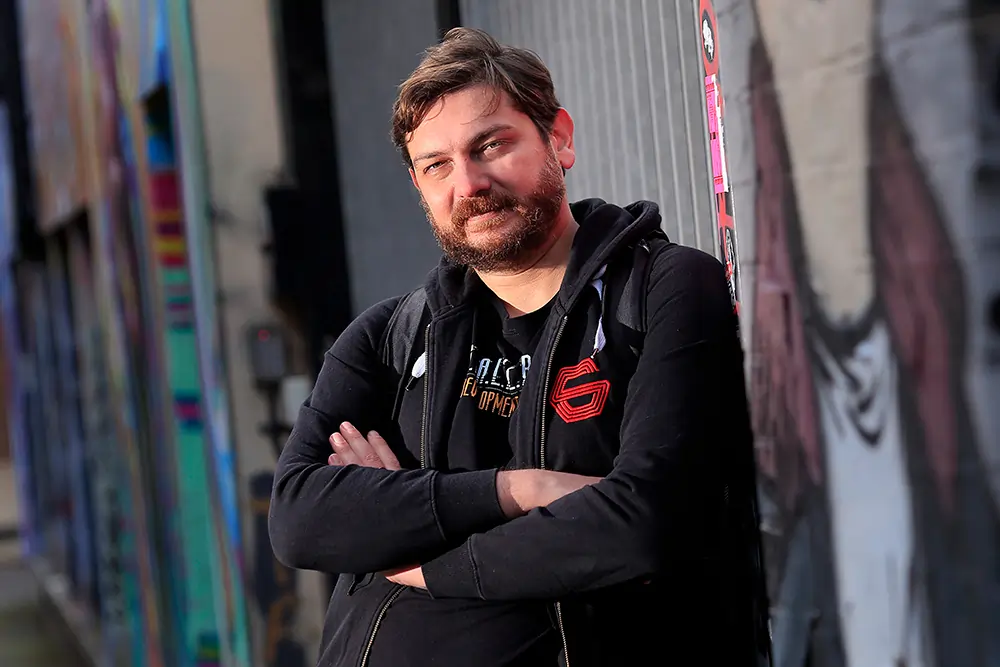British video game industry hit by brain drain as veterans defect to defence and tech sectors

Aleksey Savchenko

The British video game industry is facing a “major brain drain”, with experienced developers abandoning big-name studios for more stable roles in defence, government, and advanced tech, an industry veteran has warned
Aleksey Savchenko, a contributor for The European, said cost-cutting, poor leadership, and a growing reluctance by studios to take risks are driving top-tier talent out of the sector — leaving underprepared graduates to “pick up the slack.”
He said the exodus is stripping British studios of the creative and technical expertise that once made them world leaders.
During the 1990s and early 2000s, the UK produced global hits including Tomb Raider, Lemmings, GoldenEye 007, Populous, and Worms.
But now, the same studios are grappling with spiralling costs, bloated management structures, and an over-reliance on recycled formulas and trend-chasing content, he said.
The result is a glut of buggy, repetitive, and uninspired games that feel “unfinished on release and forgettable soon after”.
Writing in the latest print edition of The European magazine – subscribe here – Savchenko — a BAFTA member who has worked on numerous games including S.T.A.L.K.E.R. 2 , and helped expand Unreal Engine across Europe — said: “What we’re seeing isn’t just a wave of departures but a dismantling of the foundations that made British game development world-class. The studios that once led the industry are now hollowed out by short-term thinking and fear of risk.
“You can’t build innovative, lasting games when you’re constantly replacing experience with inexperience.
“The real problem is leadership. Decisions are being made by people who don’t understand how games are made, let alone what makes them fun. We’re no longer designing experiences and classics for the future but simply ticking boxes.”
Savchenko said the post-pandemic years saw studios scale aggressively, hiring fast and spending heavily during a time of unprecedented growth.
But as spending slowed and investor expectations tightened, studios resorted to cuts that disproportionately affected development teams.
And while layoffs made headlines, many experienced developers left of their own accord.
Some have gone on to lead efficiency programmes in smaller studios or build indie games on their own terms. Others have taken their skills into national security, virtual reality training, crisis simulation, and beyond — roles where the ability to design realistic environments, systems, and behaviours is critical, he said.
“Veterans didn’t just get laid off. Many walked — tired of short-sighted leadership, internal politics, and the pressure to make something profitable rather than meaningful,” Savchenko wrote in The European.
“Now they’re building simulation systems, defence platforms, and immersive public sector tools. Their work still matters — it always did. It’s just being used in industries that value it.”
While British gamers lament the decline in game quality — with nearly a third saying standards have dropped in recent years, according to a recent YouGov survey — Savchenko believes the damage is mostly being done behind closed studio doors.
He said the rot has set in “not because people don’t care, but because the industry no longer gives them the conditions to care properly”.
Savchenko added: “Technical debt piles up, tools get more complex, deadlines get tighter — and the people meant to hold it all together are either burnt out or gone.
“You can feel it in the games. The absence of joy. The lack of polish. And most of all, the unwillingness to take creative risks.”
His new novel, Cyberside: Level Zero, follows the rise of a small indie game studio that transforms into a global tech empire — one that quietly reshapes reality through the systems it builds.
Told through the eyes of James Reynolds, an ambitious engineer climbing the corporate ranks, it is said to “blend fiction with unsettling real-world parallels”.
Savchenko said the UK games industry can rebound — but only if it’s willing to rebuild on better foundations.
“Creative cultures aren’t spreadsheets. You can’t cut your way to innovation,” he added.
“If we want to see another British classic, we need to protect the people who know how to make them — and give the next generation a real chance to learn, lead, and create something new.”

RECENT ARTICLES
-
 Afore SURA awarded Pension Fund Management Company of the Year 2025
Afore SURA awarded Pension Fund Management Company of the Year 2025 -
 BOV Fund Services Limited wins in The European Banking & Finance Awards 2024
BOV Fund Services Limited wins in The European Banking & Finance Awards 2024 -
 Amberdata wins two titles in The European Banking & Finance Awards 2024
Amberdata wins two titles in The European Banking & Finance Awards 2024 -
 Ajman Bank wins in The European Banking & Finance Awards 2024
Ajman Bank wins in The European Banking & Finance Awards 2024 -
 Creditú wins three titles at The European Banking & Finance Awards 2024
Creditú wins three titles at The European Banking & Finance Awards 2024 -
 Krungthai Bank PCL wins five awards in The European Banking & Finance Awards 2024
Krungthai Bank PCL wins five awards in The European Banking & Finance Awards 2024 -
 Oakridge Property Group wins at The European Global Business Awards 2024
Oakridge Property Group wins at The European Global Business Awards 2024 -
 Old Mutual Investment Group wins two titles at The European Global Banking & Finance Awards 2024
Old Mutual Investment Group wins two titles at The European Global Banking & Finance Awards 2024 -
 AXA IM Select wins at The European Global Banking & Finance Awards 2024
AXA IM Select wins at The European Global Banking & Finance Awards 2024 -
 Zenith Bank Ghana wins five titles at The European Banking & Finance Awards 2024
Zenith Bank Ghana wins five titles at The European Banking & Finance Awards 2024 -
 SeABank awarded The Risk Management Bank of the Year - Vietnam 2024
SeABank awarded The Risk Management Bank of the Year - Vietnam 2024 -
 Vista Land & Lifescapes Inc. wins three titles at The European Global Business Awards 2024
Vista Land & Lifescapes Inc. wins three titles at The European Global Business Awards 2024 -
 Boursa Kuwait wins two titles at The European Global Sustainability & ESG Awards 2024
Boursa Kuwait wins two titles at The European Global Sustainability & ESG Awards 2024 -
 Gulf African Bank wins four titles at The European Banking & Finance Awards 2024
Gulf African Bank wins four titles at The European Banking & Finance Awards 2024 -
 Gulf Insurance Group awarded two Global Banking & Finance titles for 2024
Gulf Insurance Group awarded two Global Banking & Finance titles for 2024 -
 Eccelsa Aviation awarded three Global Business 2024 titles, including Best FBO Brand – Europe
Eccelsa Aviation awarded three Global Business 2024 titles, including Best FBO Brand – Europe -
 Afore Sura awarded Pension Fund Management Company of the Year 2024
Afore Sura awarded Pension Fund Management Company of the Year 2024 -
 Toledo Capital AG wins Best Boutique Wealth Management - Family Office 2024
Toledo Capital AG wins Best Boutique Wealth Management - Family Office 2024 -
 Banco de Chile awarded four Global Banking & Finance 2024 titles, including Bank of the Year - Chile
Banco de Chile awarded four Global Banking & Finance 2024 titles, including Bank of the Year - Chile -
 Kontora Family Office GmbH awarded Best Wealth Management Services - Germany 2024
Kontora Family Office GmbH awarded Best Wealth Management Services - Germany 2024 -
 Banque Misr awarded five Global Banking & Finance 2024 titles, including Best Banking Brand - MENA
Banque Misr awarded five Global Banking & Finance 2024 titles, including Best Banking Brand - MENA -
 Krungthai Bank PLC wins five awards in The European Banking & Finance Awards 2023
Krungthai Bank PLC wins five awards in The European Banking & Finance Awards 2023






















